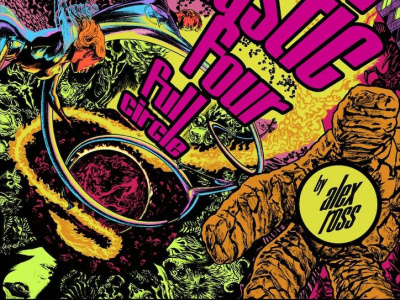Gail Burt of Metropolis Comics in Downey, California saw Steve Nemackay's comments on variant covers (see 'Steve Nemeckay of Amazing Heroes on Variant Covers') and sent us her thoughts on the issues he raised:
I like the way DC does their variant covers, on balance, more than some of the other publishers. DC tends to use its variants more to identify subsequent printings than anything else. Yes, they've done other variants, but overall, they tend to keep things fairly minimal and straightforward. Incentive variants are a thing I do not participate in - period. I order what I really want to order, and not one copy more, not even for the sake of getting a variant. I can't afford to.
If customers ask me for them, I explain how it works and tell them that if they want it, (just like Steve does) then they will have to buy all the extra copies of that book to qualify for the variant, or else pay me the equivalent in dollars. I tell them a better option is just to allow me to look around with other dealers and see if any of them are offering the variants at a decent, attainable price. If I can't get one that way, most are content to pass on it, and try to buy it online or elsewhere - which is really okay with me, as that money from that one sale going to another retailer is not threatening to me as long as I don't fear I'm going to lose my customer - and most of the time, I'm not worried about it. A fickle customer who shops based on pocketbook alone isn't one I tend to cultivate hard anyhow, I want loyal customers who will be back week after week and not be as concerned about saving a few cents as they are about the other services we offer them.
That said, I don't perceive variant covers to be nearly the matter for concern as the recent overproduction of 'tie-in' titles - especially from Marvel of late. Now, don't get me wrong, some of the stuff they put out in this vein has been very good (Spider-Man: Blue, etc.), but a lot of it is just junk. One day very recently, we were unpacking our new stuff on a Wednesday, and we just marveled (pun intended) at how many more Marvel comics there were than normal - we wondered what it must be like to have so much money that you could afford to just print a gazillion things up and throw them all at a wall and wait to see which stuck.
So let's just use Marvel as our example publisher for a moment (they are not the only ones who do this, we're just using them for the sake of having someone to use) and see how that plays in reality. The problem is that printing up a gazillion more X-Books does not result in the consumer (or the retailer) having one extra dollar to spend on them. And that's where they are going to start shooting themselves in the foot at the publisher level. People's disposable income (that which they budget for comics) is pretty much set. They may over-spend for a little while, but eventually, reality sets in and they either have to cut back or at least rein in their spending.
If there are four Spider-Man titles each month, a consumer can keep up and feel their collections are complete. But when you get to four Spider-Man titles EACH WEEK, the consumer becomes bewildered, overburdened, and discouraged - they can no longer afford to keep a complete collection of Spider-Man, so do they choose which titles to continue with? Not always. The collectors who have been with the hobby for years will wisely choose to spend their money on the best of those offered. But the newer people don't do this. The phenomenon I've seen with new customers is: THEY QUIT -
ENTIRELY. They can't afford EVERYTHING, so not really understanding that one doesn't have to collect EVERYthing, they simply quit.
So the publishers are putting out more and more money to create more and more titles per week, trying to attract more new business, and for a while it seems to work. And then discouragement sets in along with the realization that nobody has that kind of money to be able to just buy every single X-Book or every single Spider-Man spinoff, and with the newbies, the perception - despite my and some of our older customers' best efforts to convince them otherwise - is that their collections will never be complete, and so they just walk away. The sheer volume - and the ratio of good solid books to marginal ones - just scares them away.
The way I've addressed this at my store is that I order very very sparingly on the new titles - often less than 10 copies. Some, I notify my customers, I will not be carrying at all. If they want a new title, they are encouraged to let me know in advance so I can order it for them, otherwise, they might not see it in our store. Yes, that means that once in a great while, I have to tell people that I sold out of something that caught fire and actually turned out to be very good. But more often what it means is that I'm not left holding the bag with a load of unsold (and sometimes pretty sh*tty quality) comics that nobody wants, even for a quarter. It also means that my customers aren't so overwhelmed by all the choices on the wall that they are paralyzed and unable to make a decision. If I'm asked about titles I've chosen not to carry, I tell them that having been a collector since I was 8 years old myself, I have a pretty good sense of what will actually be a good, lasting book. I tell them that if I don't get a craving for a book when I see it, I don't order it for the store. If I want it, I know others will want it, too, so I do order those. I tell them that if they consider me an expert, they should trust me - and that if I miss one that turns out good, which is rare, that I will get one for them from another local dealer before it gets so pricey nobody can afford it.
Luckily, most of my customers trust me to help them avoid the fluff and filler and concentrate on the stuff they really like. Unluckily, it means I have to pay very strict attention to what's going on - much more than if I were just trying to make a buck. See, I'm trying to advance comics as a medium, plus take care of the customer base I've developed and who trust me to be their expert, PLUS make a buck. That's hard. I won't ever get rich this way. But hopefully, I won't waste my money - or my customers' - on too much junk. And hopefully, eventually the publishers will see that virtually the same amount of money per customer gets spent on comics each week - it's just the distribution of it that varies. What is it that retailers learn early? It's that 80% of your sales comes from 20% of your merchandise. Why not concentrate in that great 20% that we can all make money on, instead of attempting to compete for dollars that don't really exist? Why not concentrate on making the flagship titles so good that new customers CAN'T BEAR to give them up, and allow that to help grow our customer base, rather than throwing a million fad or spin-off titles at the wall and hoping that it will attract the eye of an 8 year old? You may sell a few copies of that one, but not many more than that. And you won't build a new customer base on that junky spin-off book either.
Each of the big publishers has what I call a 'Magnificent Seven.' A few, select, really good, really solid titles that always do well. Superman. Batman. Amazing Spider-Man, X-Men. Ultimate Spider-Man, Ultimate X-Men. Spawn. JLA. Save your energy and spend your best on THOSE - put your best writers, best artists on those titles. Go ahead and do the spin-offs if you must, but make those flagship titles as good as they can be. That's how you get - and keep - new readers. By putting out great quality books. You know, it's a joke in the comics industry, how Jim Shooter put out that memo when he became Editor-In-Chief at Marvel. People snicker about his arrogance. But arrogant or not - he was right on the money: 'Effective immediately: Please start making GOOD COMICS. I know this is hard for some of you, but do your best.'
A few good ones are worth their weight in gold next to stacks and stacks and stacks of crummy throwaway ones.







